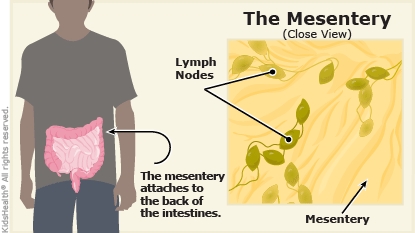Mesenteric adenitis (mez-en-TAIR-ik ad-ih-NYE-tis) is the swelling of lymph nodes in the mesentery. The mesentery is a membrane that connects the intestines to the back wall of the belly. Lymph nodes are small, bean-shaped organs. They are part of the body's immune system and help fight germs. They swell when they are fighting an infection or inflammation. Mesenteric adenitis causes belly pain. It usually gets better in a few weeks.



Your child:

Your child has severe belly pain.

What causes mesenteric adenitis? A viral or bacterial infection can cause lymph nodes in the mesentery to swell. For example, it usually happens after a gastrointestinal infection (a "stomach bug") or a respiratory infection, such as a cold. Rarely, lymph nodes can get swollen from another health problem.